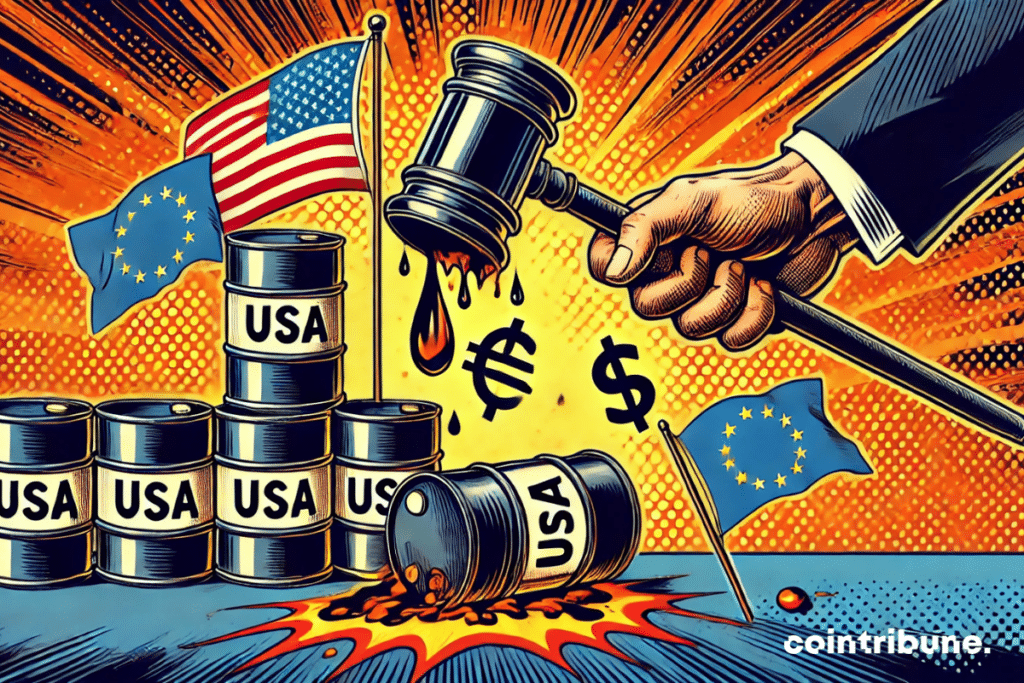Trump Targets EU Trade Surplus With Threats
The tensions between the United States and the European Union are experiencing a new escalation. Donald Trump, known for his aggressive trade policy, has targeted the European trade surplus, which he calls “huge.” The elected American president threatens to impose heavy tariffs if European countries do not reduce this imbalance through significant increases in their purchases of American oil and gas. This strategy is part of the continuity of his protectionist discourse aimed at strengthening the competitiveness of the United States on the global stage.

Clear demands to reduce a trade imbalance
On December 20, 2024, Donald Trump posted a message on his Truth social network to denounce what he describes as a “huge deficit” between the United States and the European Union. This trade imbalance, according to the 2022 figures, amounts to $202.5 billion. To address this, the former American president demanded that the EU significantly increase its purchases of oil and gas from the United States. “I told the European Union that it needed to close its huge deficit with the United States through large-scale acquisition of our oil and gas. Otherwise, it’s tariffs all the way!!!,” he declared, leaving little room for ambiguity.
This position is based on precise data. American exports to Europe amount to $350.8 billion, while European imports reach $553.3 billion. In the face of these demands, European leaders remain cautious. Indeed, they emphasize that their economic diversification strategy includes free trade agreements with other partners, such as the recent pact signed with Mercosur countries. This discreet response reflects a desire to preserve trade balances to avoid a direct confrontation.
Donald Trump’s strategy fits into a logic already observed during his previous presidency, where tariff threats served to rebalance exchanges he considered unfavorable. Indeed, the use of tariffs as an economic lever had notably targeted China and other trade partners. His return to the political scene therefore reignites speculation about the evolution of American economic diplomacy, which seems to be leaning back toward heightened protectionism.
A global consequences ultimatum
Donald Trump’s announcements are not limited to the European Union and also target other major economic powers. Among the main targets are Canada, Mexico, and China, already accustomed to trade tensions with the United States. The elected American president has threatened these countries with tariffs that could reach 25 % on their exports to the American market. According to him, these measures respond to a desire to protect the economic interests of the United States against what he qualifies as an “inundation” of foreign products.
However, the consequences of these initiatives may exceed American borders. Economists agree that such tariffs could exacerbate tensions between nations, as well as contribute to a rise in inflationary pressures globally. While many central banks, particularly the American Federal Reserve, are striving to contain inflation, these policies risk further complicating this objective. Jerome Powell, chairman of the American Central Bank, has also expressed his concerns. He mentioned the “climate of uncertainty” that these measures could create regarding economic projections, already revised upward for the coming years.
Despite his desire to strengthen the competitiveness of the United States, these protectionist initiatives could also trigger trade retaliations from the affected partners. An escalation of these tensions could affect global supply chains, already weakened by recent crises. Observers fear that these policies could lead to a fragmentation of international trade, which may compromise established trade relations and exacerbate global economic imbalances.
These trade threats clearly reflect Donald Trump’s intention to reposition the economic interests of the United States at the center of global exchanges. Yet, this approach raises crucial questions about its long-term viability, particularly regarding diplomatic relations. While the European Union explores solutions to respond to these pressures, the specter of trade retaliation increases uncertainties. In a context already marked by geopolitical tensions and economic imbalances, these initiatives could provoke a profound redefinition of global partnerships and weigh durably on the stability of international trade.
Maximize your Cointribune experience with our "Read to Earn" program! For every article you read, earn points and access exclusive rewards. Sign up now and start earning benefits.
Diplômé de Sciences Po Toulouse et titulaire d'une certification consultant blockchain délivrée par Alyra, j'ai rejoint l'aventure Cointribune en 2019. Convaincu du potentiel de la blockchain pour transformer de nombreux secteurs de l'économie, j'ai pris l'engagement de sensibiliser et d'informer le grand public sur cet écosystème en constante évolution. Mon objectif est de permettre à chacun de mieux comprendre la blockchain et de saisir les opportunités qu'elle offre. Je m'efforce chaque jour de fournir une analyse objective de l'actualité, de décrypter les tendances du marché, de relayer les dernières innovations technologiques et de mettre en perspective les enjeux économiques et sociétaux de cette révolution en marche.
The views, thoughts, and opinions expressed in this article belong solely to the author, and should not be taken as investment advice. Do your own research before taking any investment decisions.